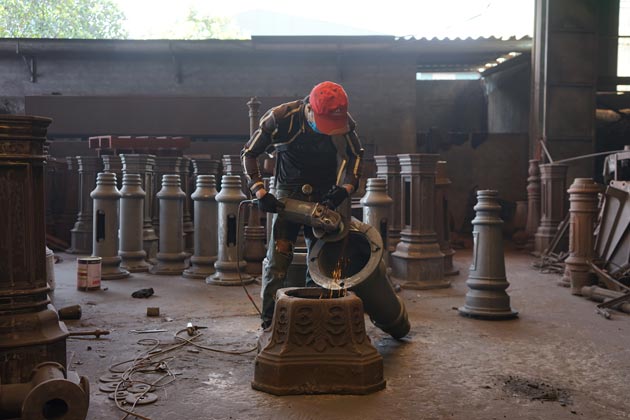Recognizing the Benefits and Innovations in the Aluminum Foundry Industry
The Aluminum Foundry industry plays an important function in modern production. Its light-weight residential properties especially enhance fuel efficiency, especially in auto and aerospace fields. In enhancement, Aluminum's resistance to corrosion assurances durability in various applications. As the market progresses, technologies such as innovative recycling and additive manufacturing are reshaping manufacturing approaches. Exploring these advancements exposes not only the benefits but likewise the difficulties ahead for Aluminum factories in a quickly transforming market.
The Lightweight Benefit of Aluminum
Aluminum's lightweight nature provides considerable advantages across numerous industries, particularly in production and transport. Its reduced thickness permits the manufacturing of elements that are much easier to set up and handle, causing reduced labor prices and boosted performance. In the automotive field, lighter automobiles add to enhanced fuel economy and reduced exhausts, lining up with worldwide sustainability goals. In aerospace, the usage of Aluminum minimizes the overall weight of airplane, which is important for improving performance and minimizing operational prices.
In addition, Aluminum's light-weight residential or commercial properties facilitate ingenious designs that were formerly impossible with much heavier products. This versatility makes it possible for producers to develop complex forms and structures while preserving architectural stability. On the whole, the lightweight benefit of Aluminum not just enhances item efficiency however also drives innovations in modern technology and style, making it a preferred product in various applications.
Rust Resistance and Resilience
The Aluminum Foundry industry is renowned for producing materials with exceptional corrosion resistance, making them ideal for different applications. This residential or commercial property, incorporated with boosted structural integrity, contributes to the resilient efficiency advantages that Aluminum elements offer. As a result, markets significantly rely upon Aluminum to meet demanding environmental conditions without jeopardizing high quality.
Superior Deterioration Resistance
While numerous steels encounter substantial obstacles from environmental factors, Aluminum stands apart for its remarkable deterioration resistance, making it a preferred choice in many applications. This home is largely due to a natural oxide layer that bases on the Aluminum surface area, providing an obstacle versus wetness and destructive agents. Unlike other steels that might corrosion or break down gradually, Aluminum preserves its stability even in severe environments, such as seaside locations or commercial settings. Additionally, its light-weight nature incorporated with rust resistance makes it suitable for applications in aerospace, automotive, and marine industries. On the whole, Aluminum's remarkable resilience not only boosts product longevity yet likewise decreases upkeep expenses, presenting an engaging advantage for customers and manufacturers alike.
Boosted Architectural Integrity
Designers and developers increasingly recognize the relevance of improved architectural stability in modern applications, where both corrosion resistance and longevity are important. Aluminum alloys, recognized for their light-weight properties, likewise exhibit phenomenal resistance to rust, making them ideal for severe settings. The innovative strategies employed in the Aluminum Foundry market add considerably to generating components with enhanced durability. Advanced casting processes and alloy make-ups are customized to meet certain efficiency requirements, making certain that structures can endure severe conditions without jeopardizing stability. Moreover, surface area treatments and finishings improve the life-span of Aluminum products, even more minimizing wear and tear gradually. This concentrate on enhanced structural integrity not only prolongs the functionality of materials however likewise decreases upkeep expenses, solidifying Aluminum's setting as a material of choice in various sectors.
Durable Efficiency Conveniences
Durable efficiency in Aluminum elements is mainly associated to their remarkable rust resistance and longevity. Unlike several steels, Aluminum normally develops a protective oxide layer, which avoids rust and deterioration in various atmospheres, including commercial and marine settings. This integral home considerably extends the life-span of Aluminum items, lessening maintenance and substitute expenses. In addition, the light-weight nature of Aluminum improves its applicability across sectors without jeopardizing stamina. The product's resistance to deterioration likewise adds to its dependability sought after applications, making it a suitable option for automotive, aerospace, and building and construction fields. As markets increasingly focus on sustainability and longevity, Aluminum's efficiency benefits straighten with modern design needs, strengthening its role in cutting-edge manufacturing procedures.
Environmental Influence and Sustainability
 As the Aluminum Foundry industry advances, it increasingly focuses on ecological impact and sustainability, acknowledging the demand for responsible methods despite climate modification. Initiatives to decrease waste and energy usage are at the forefront, with lots of foundries adopting reusing campaigns to reclaim Aluminum scrap. This not only minimizes resources usage yet additionally especially reduces power expenditure, as recycled Aluminum calls for just a fraction of the energy compared to primary production.
As the Aluminum Foundry industry advances, it increasingly focuses on ecological impact and sustainability, acknowledging the demand for responsible methods despite climate modification. Initiatives to decrease waste and energy usage are at the forefront, with lots of foundries adopting reusing campaigns to reclaim Aluminum scrap. This not only minimizes resources usage yet additionally especially reduces power expenditure, as recycled Aluminum calls for just a fraction of the energy compared to primary production.In addition, developments in discharges regulate modern technologies are being implemented to decrease air pollutants, lining up operations with stricter environmental policies. Foundries are also exploring alternative energy resources, such as solar and wind, to power their centers sustainably. By cultivating partnership with stakeholders, the market aims to develop ingenious services that enhance ecological stewardship. Jointly, these campaigns highlight a dedication to lowering the Aluminum Foundry's carbon impact while promoting a circular economic climate within the manufacturing industry.
Advanced Manufacturing Techniques
 Changing manufacturing procedures, the Aluminum Foundry market is progressively incorporating advanced production strategies to enhance efficiency and accuracy. Methods such as computer system numerical control (CNC) machining and additive production have arised as necessary components in maximizing production process. CNC machining enables high-precision element fabrication, significantly reducing product waste and manufacturing time. At the same time, additive manufacturing opens up new avenues for complicated geometries and lightweight layouts that were previously difficult to attain.
Changing manufacturing procedures, the Aluminum Foundry market is progressively incorporating advanced production strategies to enhance efficiency and accuracy. Methods such as computer system numerical control (CNC) machining and additive production have arised as necessary components in maximizing production process. CNC machining enables high-precision element fabrication, significantly reducing product waste and manufacturing time. At the same time, additive manufacturing opens up new avenues for complicated geometries and lightweight layouts that were previously difficult to attain.In addition, the implementation of automation and robotics in Aluminum shops streamlines operations, lessens human mistake, and improves worker security. These modern technologies help with a more receptive manufacturing setting, enabling makers to adapt rapidly to market needs. The assimilation of sophisticated simulation software application better enhances the style and screening phases, resulting in premium product top quality. Collectively, these techniques not only enhance functional efficiency but also foster development, positioning the Aluminum Foundry sector at the leading edge of contemporary production.
Innovations in Recycling Processes
The Aluminum Foundry market is not only advancing in manufacturing strategies yet is additionally making considerable strides in recycling processes. Advancements are emerging to enhance the efficiency of reusing techniques, decreasing energy consumption and improving sustainability. Advanced sorting modern technologies, such as computerized optical sorting, make it possible for the recognition and separation of Aluminum from other materials with high accuracy. This leads to a better of recycled Aluminum, which is essential for keeping the integrity of the final items.
Closed-loop recycling systems are being applied, enabling suppliers to recycle Aluminum scrap within their own manufacturing processes. This decreases waste and promotes a round economic situation. Furthermore, research study right into brand-new recycling techniques, such as hydrometallurgical procedures, provides the potential for recuperating Aluminum from complex waste streams. These advancements not only add to lowering the carbon impact of the Aluminum Foundry sector yet likewise boost its financial practicality in a progressively environmentally aware market.
Applications Throughout Different Industries
Many markets are increasingly recognizing the adaptability and benefits of Aluminum Foundry products, leading to extensive applications across fields such as vehicle, construction, customer, and aerospace products. In the vehicle industry, Aluminum spreadings add to light-weight vehicle layouts, boosting gas performance and performance. Aerospace manufacturers use Aluminum components for their strength-to-weight proportion, necessary for airplane frameworks and components.
In construction, Aluminum is favored for its durability and resistance to deterioration, making it optimal for home window frameworks, roof, and structural assistances. Durable goods additionally profit from Aluminum Foundry items, as seen in cookware, electronic devices, and product packaging, read the article where light-weight and recyclable products are crucial.
The flexibility of Aluminum Foundry strategies permits exact specs and elaborate designs, catering to the diverse needs of these markets. Therefore, Aluminum Foundry products are coming to be important to modern-day manufacturing procedures throughout different markets.
Future Patterns in Aluminum Foundries
As industries remain to evolve, Aluminum shops are positioned to welcome a number of essential patterns that have a peek here promise to boost performance and sustainability. One prominent trend is the boosting fostering of electronic modern technologies, consisting of automation and synthetic knowledge, which enhance procedures and enhance quality control. Furthermore, the push in the direction of lasting methods is leading factories to purchase reusing modern technologies, significantly minimizing waste and energy consumption.
 An additional arising pattern is the usage of sophisticated alloys and products, accommodating the growing need for light-weight and long lasting parts across different fields (Aluminum Foundry). Additionally, the combination of additive production methods is anticipated to revolutionize part style, supplying personalization and minimizing preparations
An additional arising pattern is the usage of sophisticated alloys and products, accommodating the growing need for light-weight and long lasting parts across different fields (Aluminum Foundry). Additionally, the combination of additive production methods is anticipated to revolutionize part style, supplying personalization and minimizing preparationsCooperation with research organizations is additionally expected to drive development, as foundries seek to develop new procedures and materials. Aluminum Foundry. Collectively, these patterns suggest a transformative future for the Aluminum Foundry industry, aligning with broader goals of sustainability and effectiveness
Frequently Asked Questions
What Are the Regular Prices Associated With Aluminum Foundry Production?
The regular expenses connected with Aluminum Foundry production consist of basic materials, labor, energy, devices upkeep, and overhead expenditures. These factors jointly influence the total economic investment needed for effective Aluminum casting operations.
How Does Aluminum Compare to Other Metals in Strength?
Aluminum, while lighter than numerous steels, shows outstanding strength-to-weight proportions. Contrasted to steel, Aluminum is less solid but supplies superb rust resistance, making it a positive choice in applications where weight and sturdiness are essential.
What Safety and security Steps Remain In Location in Aluminum Foundries?
Precaution in Aluminum factories typically consist of obligatory individual protective tools, ventilation systems to control fumes, normal tools maintenance, training programs for employees, and adherence to strict safety laws to decrease risks connected with molten steel handling.
Exactly How Is High Quality Control Managed in Aluminum Casting Processes?
Quality assurance in Aluminum casting procedures includes extensive examinations at different phases, consisting of basic material assessment, process surveillance, and end product screening. Techniques such as analytical procedure control and non-destructive screening assurance adherence to industry standards.
What Qualifications Are Necessary for Aluminum Foundry Providers?
The relevance of accreditations for Aluminum Foundry distributors includes ISO 9001 for top quality management, ISO 14001 for ecological management, and industry-specific requirements like ASTM and SAE, ensuring compliance, safety and security, and dependability in manufacturing procedures.
The Aluminum Foundry visit site industry plays a vital duty in modern production. The Aluminum Foundry market is renowned for generating products with superior deterioration resistance, making them perfect for numerous applications. Transforming manufacturing processes, the Aluminum Foundry sector is progressively integrating innovative production methods to improve effectiveness and precision. The Aluminum Foundry market is not only advancing in producing strategies however is additionally making substantial strides in recycling procedures. As sectors continue to progress, Aluminum foundries are positioned to accept several crucial trends that assure to improve effectiveness and sustainability.